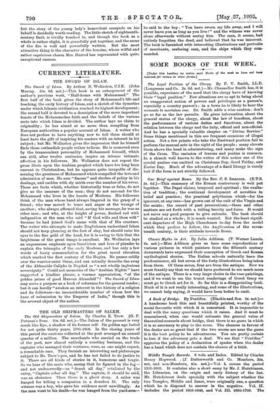THE SWORD OF ISLAM.
The Sword of Islam. By Arthur N. Wollaston, C.I.E. (John Murray. 10s. 6d. net.)—This book is an enlargement of the author's previous Work, "Half-hours with Muhammad." The first half of the book gives the story of Mohammed's life and teaching, the early history of Islam, and a sketch of the dynasties under which Islamic civilisation reached its highest development; the second half is devoted to a description of the more important tenets of the Mohammedan faith and the beliefs of the various Sects into which Islam is divided. The author lays no claim to Originality; he has aimed at no more than compiling from European authorities a popular account of Islam. A writer who does not profess to have anything new to tell them should at least have the gift of inspiring his readers with an interest in his subject ; but Mr. Wollaston gives the impression that he himself Ands these outlandish people rather tedious. He is unmoved even by the transcendent personality of Mohammed himself, which can still, after twelve centuries, inspire an intense intimate affection in his followers. Mr. Wollaston does not repeat the gross libels upon the Arabian prophet which have too long been eurrent in Christendom, but he appears quite incapable of dis- cerning the greatness of Mohammed which compelled the love and admiration of men. He sees "finesse" and strokes of policy in his dealings, and cackles with sly mirth over the number of his wives. These are facts which, whether historically true or false, do not give us the measure of the man; they do not account for the Mohammed who lives in the hearts of Moslems. His followers think of the man whose hand always lingered in the grasp of a friend; who was moved to tears and anger at the wrongs of another ; who always affirmed that, saving his message, he was as other men ; and who, at the height of power, flushed red with indignation at the man who said "If God wills and thou wilt" because he had joined God's name with that of His creature. The writer who attempts to make Englishmen understand Islam should not keep glancing at the feet of clay, but should raise his eyes -tb the fine gold of the head, for it is owing to this that the brightness of the great image is excellent. Mr. Wollaston lays an ungenerous emphasis upon fanaticism and love of plunder to explain the triumphs of the early Moslems, and has only a few words of hasty commendation for the great moral elevation which marked the first century of the Hegira. He passes coldly over the warrior-saint Omar, and can actually describe the sway of the Abbasside Caliphs in Bagdad as "a not wholly inglorious sovereignty." Could not memories of the "Arabian Nights" have suggested a kindlier phrase, a warmer appreciation, "of the golden prime of good Hamm Alraschid" ? The Sword of Islam may serve a purpose as a book of reference for the general reader; but it can hardly "awaken an interest in the history of a religion and its followers—no inconsiderable number of whom bow the knee of submission to the Emperor of India," though this is the avowed object of the author.






































 Previous page
Previous page